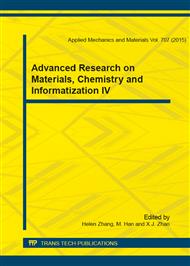p.471
p.476
p.480
p.487
p.493
p.497
p.501
p.505
p.509
Data Processing in Model of the Bank Credit Risk Assessment Based on Asset Assessment
Abstract:
Asset assessment theory research lagging behind the industry development is an important problem existing in current assessment industry, and the construction of theoretical framework system is particularly urgent. Asset appraisal theory frame system is divided into the logical starting point and the theoretical framework. According to the connotation of asset assessment and the concept of the logic starting point in philosophy, the logic starting point of the asset assessment is thought to be the value discovery. According to the relationship to the logical starting point, establish a theoretical framework with four-layers, which takes the value found as the qualitative, nine evaluation factors as the kernel, takes the legal system, exam training, industry, rules and member acknowledges as the outer core, takes the institutional environment, economic environment, social and cultural environment etc. as the evaluating environment.
Info:
Periodical:
Pages:
493-496
DOI:
Citation:
Online since:
December 2014
Authors:
Keywords:
Price:
Сopyright:
© 2015 Trans Tech Publications Ltd. All Rights Reserved
Share:
Citation:


